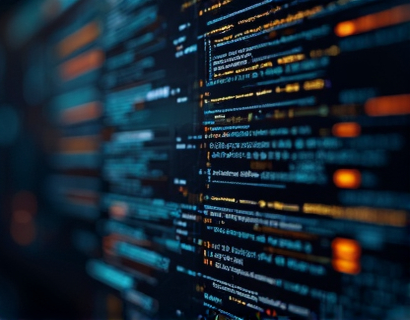The Convergence of AI and Crypto: Pioneering the Next Wave of Fintech Innovation
The intersection of artificial intelligence (AI) and cryptocurrency is giving birth to a new era in financial technology (FinTech), one that promises to revolutionize the way we interact with financial services. This convergence is not merely a technological advancement but a paradigm shift that is redefining the very foundations of banking and finance. For tech-savvy crypto enthusiasts and innovators, this synergy represents an exciting frontier, filled with opportunities to create intelligent, efficient, and personalized financial solutions.
Understanding the Individual Impacts
Before delving into the synergy between AI and crypto, it's essential to understand the individual impacts of each technology on the FinTech landscape. AI has already begun to transform traditional banking by automating routine tasks, enhancing customer service through chatbots, and providing sophisticated analytics for risk management and fraud detection. Its ability to process vast amounts of data quickly and accurately makes it an invaluable tool for financial institutions seeking to improve efficiency and reduce costs.
On the other hand, cryptocurrency has disrupted the traditional financial system by introducing a decentralized, digital form of currency that operates on blockchain technology. This has enabled peer-to-peer transactions without the need for intermediaries, reducing transaction costs and increasing financial inclusion. Cryptocurrencies have also opened up new avenues for investment and wealth management, attracting a diverse range of users from tech-savvy individuals to institutional investors.
The Synergy of AI and Crypto
The true power of AI and crypto is realized when they are combined. AI can enhance the functionality and security of blockchain-based systems, while blockchain can provide a transparent and immutable record for AI algorithms to learn from. This synergy is leading to the development of intelligent financial solutions that are more secure, efficient, and tailored to individual needs.
One of the key areas where AI and crypto converge is in the realm of smart contracts. Smart contracts are self-executing contracts with the terms of the agreement directly written into code. AI can optimize these contracts by analyzing vast amounts of data to identify the most efficient and secure terms, reducing the risk of errors and fraud. This not only streamlines the contract execution process but also enhances trust and transparency in transactions.
Enhancing Security Through AI
Security is a paramount concern in the crypto space, and AI plays a crucial role in bolstering it. Machine learning algorithms can detect and prevent fraudulent activities by identifying patterns and anomalies in transaction data. These algorithms can adapt over time, becoming more effective at spotting potential threats. Additionally, AI can enhance the security of private keys and wallet management, reducing the risk of hacking and unauthorized access.
Blockchain itself offers a level of security that AI can further augment. The decentralized nature of blockchain makes it resistant to single points of failure, but AI can improve this by predicting and mitigating potential vulnerabilities. By continuously monitoring the network and analyzing data, AI can proactively address security issues before they become critical.
Personalized Financial Services
AI-driven personalization is transforming the way financial services are delivered. In the context of crypto, this means creating tailored investment strategies, wallet management tools, and financial advice based on individual user data. AI algorithms can analyze a user's transaction history, risk tolerance, and financial goals to provide customized recommendations. This level of personalization not only enhances user experience but also increases the effectiveness of financial solutions.
For instance, AI can help users optimize their crypto portfolios by suggesting the best times to buy or sell based on market trends and historical data. It can also provide real-time alerts and insights, helping users make informed decisions. This personalized approach is particularly valuable in the volatile crypto market, where timing and strategy are crucial.
Improving Accessibility and Financial Inclusion
One of the most significant benefits of the AI and crypto convergence is the potential to improve financial inclusion. Traditional banking systems often exclude large segments of the population due to high costs and stringent requirements. Cryptocurrency, combined with AI, can provide a more accessible and affordable alternative. AI-powered identity verification and credit scoring can reduce barriers to entry, allowing more people to participate in the global financial system.
Moreover, AI can help bridge the knowledge gap by providing educational tools and resources in a user-friendly format. This can empower individuals to better understand and manage their finances, fostering a more financially literate population. For those in underserved regions, this access to information and financial tools can be transformative, opening up new economic opportunities.
Challenges and Considerations
Despite the numerous benefits, the convergence of AI and crypto is not without challenges. Regulatory uncertainty remains a significant hurdle, as governments worldwide are still grappling with how to regulate these emerging technologies. Ensuring compliance while fostering innovation is a delicate balance that requires collaboration between regulators, technologists, and industry stakeholders.
Another challenge is the technical complexity involved in integrating AI with blockchain systems. Developing robust and scalable solutions that can handle the high transaction volumes and security requirements of crypto platforms is a complex task. However, ongoing research and development are addressing these issues, paving the way for more seamless integration.
The Future Landscape
Looking ahead, the future of FinTech is increasingly intertwined with AI and crypto. As these technologies continue to evolve, we can expect to see even more innovative applications. For example, decentralized finance (DeFi) platforms are leveraging AI to create more sophisticated and user-friendly financial services, from lending and borrowing to insurance and derivatives trading.
AI-driven predictive analytics will play a crucial role in shaping the future of crypto markets, providing deeper insights into market trends and behavior. This can lead to more stable and efficient markets, reducing volatility and enhancing investor confidence. Additionally, the integration of AI with other emerging technologies, such as the Internet of Things (IoT) and 5G, will further expand the possibilities for financial innovation.
Conclusion
The convergence of AI and crypto is not just a technological trend but a fundamental shift in the FinTech landscape. It offers a pathway to more intelligent, efficient, and personalized financial solutions, redefining the way we interact with money and assets. For tech-savvy crypto enthusiasts and innovators, this synergy represents a fertile ground for exploration and innovation. As the technologies continue to mature, the potential for transformative change in the financial sector is immense, promising a future where finance is more accessible, secure, and tailored to individual needs.










































